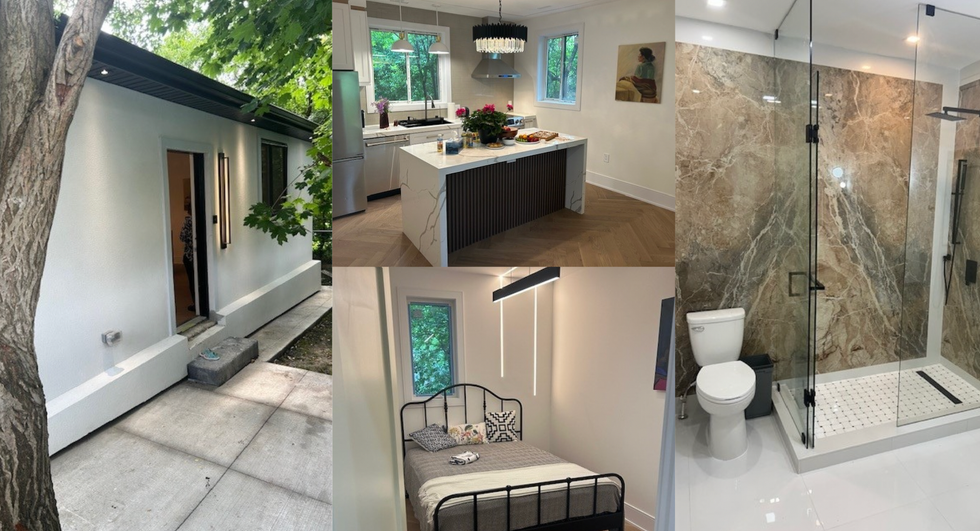"Members of the public, homeowners, sometimes they resist change," says Andrew Whittemore, Commissioner of Planning and Building at the City of Mississauga. "But when they experience it and they see it firsthand, it makes them sort of realize, you know what? It's not that bad. Maybe I'll do it myself."
The change Whittemore speaks of is Mississauga's decision to update its Official Plan and Zoning By-law in late 2023 to make it easier for homeowners to build up to two Additional Residential Units (ARUs) on their property, such as a garden or laneway suite, or basement apartment.
The following June, the City aimed to further incentivize the development of these infill housing units by providing residents with free, pre-approved garden suite plans, which they made available to individuals across the province on National Housing Day in November 2024. Following in Mississauga's footsteps, just this month, the City of Toronto released their own free and pre-approved plans for garden and laneway suites.
With blueprints in hand, garden suite hopefuls can now save on planning and design costs, while city staff is able to more quickly approve plans, spurring the development of these secondary dwellings across Mississauga and beyond, and helping to achieve the City's goal of getting more homes built, streamlining building approvals, and making homes more affordable.
The designs include a 430-sq.-ft open-concept studio and a 600-sq.-ft one-bedroom suite that contain both a kitchen and a three-piece bathroom. While rigid in their layout, the suites are fully customizable, down to the paint, plumbing fixtures, flooring, and exterior siding.

Roughly a month after the designs were released, STOREYS spoke with Whittemore to get an idea of how effective the initiative had been. At the time, he reported that the City had seen 30 inquiries into building garden suites and one application — not the surge one would hope to see, but a positive start that got the City thinking of other ways to boost interest, such as providing more information on their website, reducing unnecessary application requirements, and waiving certain fees.
Just over a year out, Whittemore shares that things have picked up, even despite broad economic headwinds. There are now over 100 inquiries as of mid-June, 50 permit applications, and about four or five garden suites that have been constructed or are underway. One, Whittemore shares, recently underwent inspection. "It's absolutely beautiful," he says. "It exceeds everything that we had expected of this project."

One major development that Whittemore says resulted in the increase in garden suite applications and inquiries was Mississauga City Council's July-2024 adoption of the Affordable Rental Housing Community Improvement Plan (CIP) that directed $44 million in funding to support affordable rental housing, including grants for homeowners and developers building additional units.
CIPs are provincial tools that allow municipalities to spur development through the allocation of loans and grants, and Mississauga's was adopted as a key action under Growing Mississauga: An Action Plan for New Housing.
In part, the CIP allows the City to remove building permit fees for garden suites — which are already not subject to development charges — but it also does away with development charges and parkland dedications cash in lieu formerly required for larger ARUs, like fourplexes, further incentivizing gentle density.
"[It] really creates a more affordable project for both the builder and hopefully for the renter," says Whittemore. "We know that gentle infill is not going to solve the housing crisis, but from my perspective, I felt there was a lot of value, and so did our Mayor and Council, obviously, in trying to incentivize [ARUs] where we can."
On top of waiving permit fees, the City noticed a need for readily available, detailed information to inform their largely inexperienced clientele: everyday homeowners. "Our client, in most of these situations, is a non-developer, non-builder," says Whittemore. "So on our webpage, we've really enhanced it to help those [...] folks figure out how to do this, what it's going to cost, who they need to talk to, those type of things."
When STOREYS spoke to Whittemore last June, he had also shared that the City was looking to expand the initiative to include plans for two-storey builds and even four-units, something Whittemore says is still "very much a top priority" and will likely be delivered by Q2-2026.
One major aspect of delivering initiatives like these, he shares, is making sure the public is looped in. One way they've done that is by partnering with Sheridan College to brainstorm around 26 designs for four-unit homes that incorporated the needs of demographics that would inhabit them, including seniors, young people, and families.
"Part of that effort is so that I can use those to show the community how amazing a four-unit design can be," says Whittemore. "Before we get to more detailed launching, we really want to bring the public along to understand what these are going to look like."
For Toronto and municipalities across the GTA, clear communication on growth initiatives like what we're seeing in Mississauga is key, as there can be pushback from existing residents as municipalities move towards more gentle density in historically single-family-home neighbourhoods. When asked about community feedback on the City's legalization and push to incentivize the construction of more ARU's like garden suites, Whittemore says the reception has been largely positive.
"I don't think there's ever a change in a neighbourhood where someone doesn't have a comment about it," says Whittemore. "There are usually comments, some of them are positive, some of them can be negative, [...] but overall, I've heard pretty much positive, and I think it's because a lot of it is resident driven. These are not developers coming in to build something and then leave. These are people who are investing in their properties and their neighbourhoods."
As for municipal governments considering implementing a similar initiative, Whittmore has one piece of advice: "Be very open to hearing and to listening and understanding what the challenges are on the ground. [...] You have to be somewhat open and comfortable with being a little creative and challenging the status quo. I don't think you go into this with a status-quo kind of mindset."





















